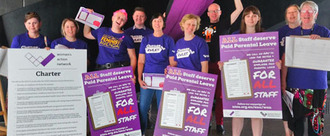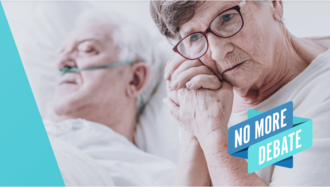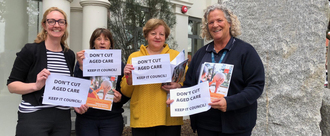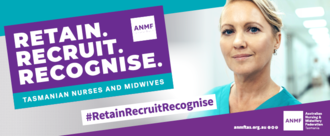- Featured
- Asylum Seekers and Migrants
- Climate and Environmental Justice
- Disability Justice
- Economic Justice
- Education
- First Nations Justice
- Health and Medicare
- International Solidarity
- LGBTIQA+ Rights
- Media and Arts
- Occupational Health and Safety
- Public Services
- Public Transport
- Racial Justice
- Social Justice
- Women's Rights
- Workers' Rights
- More
-
Fix the crisis in aged careWe are family members, older Australians, and workers in aged care and we are campaigning so that every Australian can have a dignified life in retirement. We believe that quality care is directly linked to quality jobs. Care workers should have enough time to do their jobs, get a fair wage and be trained to deliver quality care. Aged care should be funded so care workers have enough time to provide quality care and there is transparency and accountability about how public funding is spent.863 of 1,000 SignaturesCreated by Georgia Potter Butler
-
Save our mental health services!If the Federal Coalition Government fails to immediately commit to fund community mental health programs for at least 3 years and fix the massive funding gap that has caused this crisis – the whole community is going to suffer. Thousands of experienced mental health workers will lose their jobs. Tens of thousands of people with mental health issues will be left without any support and nowhere to go. It’s a crisis, and it’s happening now. Sign the petition and share. We need every signature to call on the Government to fix this crisis. It cannot wait.1,498 of 2,000 SignaturesCreated by Australian Services Union
-
Support Victorians with disabilities and the people who care for themIf employers continue to be bound by the current arrangements, they will soon be unable to continue delivering key services. We’ll see large-scale job-losses, loss of expertise, disruption of services to clients and a high potential for reduction in the quality of services. Without this support, Victoria’s disability sector will likely fail to retain the skilled and committed workers required under the NDIS, potentially resulting in widespread market failure across Victoria. We need to see an investment of $46 million over 3 years, to deliver the quality NDIS that people with disabilities so rightly demanded. This represents just 7 cents in every dollar that the Victorian government will contribute to the NDIS in a single year – but the impact will be huge.184 of 200 SignaturesCreated by Clare Neal
-
All staff deserve employer-paid parental leaveThe current system creates inequities within the workforce, and can lead to serious hardship on families experiencing psychological and financial stress. The careers of women and primary carers can also be negatively impacted. "I returned to work at the ANU ten days after giving birth to my son. My family needed the income, but it wasn’t just this – I also needed to secure my next contract. It was important for me that my supervisors were happy with my performance and recommended me for my next contract. This was a very difficult time. I had psychological health problems. I felt guilty about leaving my son, and would try to see him to breastfeed on my lunchbreaks" (Professional staff member at ANU). By adopting employer-paid parental leave for all staff, ANU will keep pace with other universities in the sector who already provide paid parental leave on either a full or pro-rata basis for their staff. It will also help to: • Reduce financial stress on the families of staff who are experiencing loss of their weekly income to care for their children. • Reduce risks to maternal and child health from returning to work early, and support international guidelines on breastfeeding. • Contribute to ANU’s gender equality goals that aims to ensure all staff, regardless of their identity or sexual orientation, can contribute to their child’s wellbeing. Read the open letter to Vice-Chancellor Brian Schmidt from the NTEU Women's Action Network at nteu.org.au/anu/wan.438 of 500 SignaturesCreated by NTEU Women’s Action Network (ANU)
-
No Mind Left BehindCampus counselling services usually cap the number of sessions offered to individual students each year. As mental health support off-campus isn’t accessible to many students, this locks them out of mental healthcare either entirely or for extended periods. Counselling sessions at universities must be uncapped. Campus counselling services rarely hire enough staff to meet student demand, forcing students to wait weeks or even months to book sessions with no mental healthcare while they wait. Universities must adequately staff counselling services to keep wait times for sessions below two weeks. Some campus counselling services prevent students from booking sessions at all through walk-in only policies. In other services bookings can be made but only in person, not online or over the phone. But for many students with mental ill health or various disabilities, such policies prevent them from accessing sessions at all. Students must be able to book sessions in advance and through accessible methods. At some campus counselling services students have no choice of counsellor, they're stopped from changing counsellors as needed or forced to change counsellors against their wishes, neither of which is conducive to effective mental healthcare. Students must be allowed to choose counsellors according to their needs. Many campus counselling services don’t provide specialist services relevant to students’ needs, such as counsellors trained to support students with experiences of sexual assault, trauma, and psychological conditions other than depression and anxiety. Universities must provide counsellors with training relevant to the mental health issues students are affected by. Universities largely fail to promote campus counselling services to all students. Many promote services inconsistently during peak times like orientation and exams but not all year, and promotion often targets first years but not other students. Universities must do more to promote services and regularly integrate promotion into communications with students.513 of 600 SignaturesCreated by NUS Disabilities

-
Increase Pharmacy PayPharmacists study for 4 years, undertake an intern year and continuous professional development through their careers to ensure they can care for our community. That they are paid under $54,000 for such a vital job is a national shame. For two years Professional Pharmacists Australia (PPA) have argued in the Fair Work Commission to increase wages. Our members have provided evidence that a pharmacist’s work-value has increased with greater educational requirements, greater responsibilities and workload and yet pay has not kept up with change. The Fair Work Comission has rejected raising all wages, but will now consider intern and pharmacist rates and allowances for professional services. Sign to support our final submission to raise pay and ask your colleagues to sign as well.1,499 of 2,000 SignaturesCreated by Professional Pharmacists Australia
-
Respect our dignity!I support Victorians’ Voluntary Assisted Dying legislation. That’s why I’m asking all candidates to commit to this legislation, so that Victorians with a terminal illness receive the compassion and dignity they deserve at the end of their lives. It is time to end the division on this important issue. Victoria is the first state to pass voluntary assisted dying legislation. Conservatives now want to deny Victorians compassion and dignity at the end of their lives. For more information, visit: https://www.nomoredebate.org.au/523 of 600 SignaturesCreated by Dying With Dignity
-
Protect home support servicesThere are approximately 19,000 Victorians in receipt of aged care packages and more than 14,500 on waiting lists, many of whom will be in receipt of Council delivered Home Care. Council’s withdrawal from home support services will impact on these individuals and their families increasing system fragmentation and uncertainty.178 of 200 Signatures
-
Protect home support in your communityThere are approximately 19,000 Victorians in receipt of aged care packages and more than 14,500 on waiting lists, many of whom will be in receipt of Council delivered Home Care. Council’s withdrawal from home support services will impact on these individuals and their families increasing system fragmentation and uncertainty.127 of 200 Signatures
-
Fair deal for ACT Health PharmacistsHospital pharmacists at ACT Health are under immense pressure, overworked and understaffed. Despite months of meetings with management, and the Minister, they have failed to deliver a deal which guarantees better pay or an improved classification structure. Ongoing inaction by the Government is reckless and irresponsible – the workforce has put up with this for too long and is now at breaking point.276 of 300 SignaturesCreated by Professional Pharmacists Australia
-
Retain. Recruit. Recognise. Tasmanian Nurses and MidwivesIn 2016, the Government agreed to reassess the model of staffing for nurses in the state’s public system. This body of work has not been completed in the agreed timeframe and left Tasmanian nurses and midwives concerned about the potential risks to the community. Information provided by the Tasmanian Health Service show that there are currently more than 250 nursing jobs vacant in the public health system in Tasmania. Combine this with the fact that by April 2019 Tasmanian nurses will be the lowest paid in Australia* this paints a serious problem for our health system. With the shortage of nurses and the increasing pressure due to lack of beds across the state, we are calling on your support, whether you are a nurse, midwife, care worker, politician, family member or concerned community member to help show the government that we need to stop disregarding the future of nursing in Tasmania and take action to retain, recruit and recognise these valuable community members. *As compared to a Registered Nurse Grade 3 year 8 or equivalent1,209 of 2,000 SignaturesCreated by ANMF Tas Branch

-
Increase Bereavement Leave #LeaveToGrieve"When my father died I was at Uni, there was no question about how much time I would take off, I took what I needed. My mother however, who was in the workforce was expected to take only 2 days leave to grieve." In Australia, employees are only allocated 2 days leave to grieve when someone they love has passed away. There are so many considerations both physically and emotionally as you adjust to your altered reality. Recent models of bereavement recognise the oscillating nature of grief; where our view moves from a loss orientation to an orientation of restoring our changed world in some way. 2 days bereavement leave is more like funeral leave. Memoleaves is a website devoted to sharing grief and end of life stories. Our research into the state of bereavement leave is available here, we continue to research this important area. With this petition we hope to shine a light on the insufficient amount of bereavement leave as decreed in the National Employment Standards. Grief doesn't discriminate and neither should we.10 of 100 SignaturesCreated by Memo Leaves



.png)









